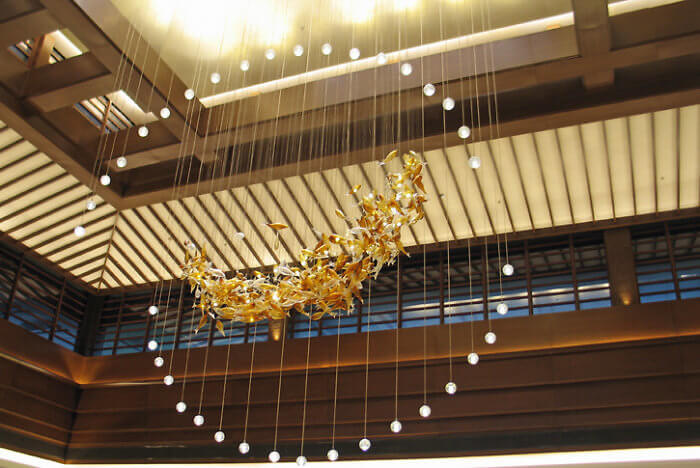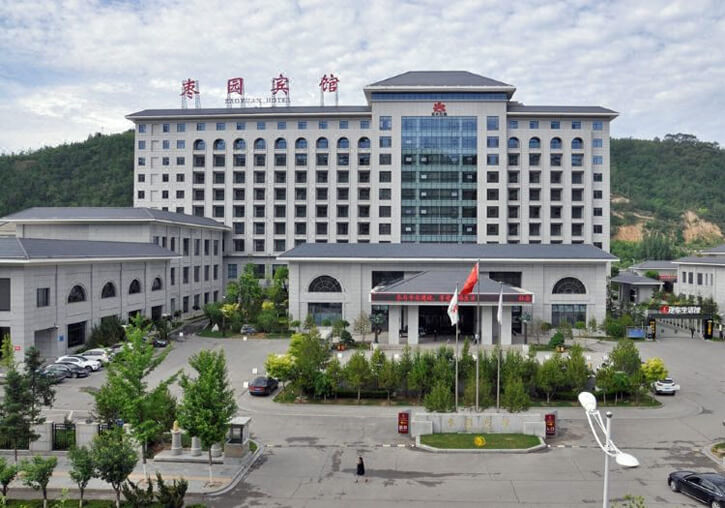 Everything is new at the Wenyuange Hotel, Huangmiao Street and Huancheng East Road, Jincheng District, Hancheng, Shaanxi, China. That’s because it was completed less than two years ago, no doubt in anticipation of a tourist boom when the high-speed train link to Xi’an is completed (the train station is about 2 km away).
Everything is new at the Wenyuange Hotel, Huangmiao Street and Huancheng East Road, Jincheng District, Hancheng, Shaanxi, China. That’s because it was completed less than two years ago, no doubt in anticipation of a tourist boom when the high-speed train link to Xi’an is completed (the train station is about 2 km away).
 The geometric lines of the check-in desk in the lobby are softened by the wanton disarray of an amber glass sculpture in the soaring atrium. Hundreds of fish shapes swim in the air, perhaps as a nod to the city’s location at the point where the south-flowing Yellow river enters the Guanzhong Plain.
The geometric lines of the check-in desk in the lobby are softened by the wanton disarray of an amber glass sculpture in the soaring atrium. Hundreds of fish shapes swim in the air, perhaps as a nod to the city’s location at the point where the south-flowing Yellow river enters the Guanzhong Plain.
Although it has just 121 guest rooms, there is an indoor pool and a fitness center. Each room in the four-star property has a minibar, safe, coffee/tea maker and an LCD television with cable channels plus in-room WiFi and free bottled water. All the usual amenities are in place: Bathrooms include a bath and shower, bathrobe, slippers, and toiletries.
 Two restaurants provide dining options on-site, but if you’re more adventurous, ask the hotel concierge for walking directions to the “gourmet street”. You add value to a debit card at the cashier’s station at the entrance, then use the card to buy tasty delights from the vendors. (If you have money left over after munching, you can recoup the difference by handing in the card as you exit.)
Two restaurants provide dining options on-site, but if you’re more adventurous, ask the hotel concierge for walking directions to the “gourmet street”. You add value to a debit card at the cashier’s station at the entrance, then use the card to buy tasty delights from the vendors. (If you have money left over after munching, you can recoup the difference by handing in the card as you exit.)
- Search for Great Tours HERE
- Buy Travel Insurance
- Get a Car Rental
 Hancheng is a city in Shaanxi Province, about 125 miles northeast of Xi’an (home of the legendary Terracotta Warriors). There are 20 or so buildings dating from the Yuan Dynasty (1271-1368), more than any other city in Shaanxi. In total, there are more than 140 protected historical sites ranging from the Tang (beginning in 618 CE) to the Qing (ending in 1912) dynasties.
Hancheng is a city in Shaanxi Province, about 125 miles northeast of Xi’an (home of the legendary Terracotta Warriors). There are 20 or so buildings dating from the Yuan Dynasty (1271-1368), more than any other city in Shaanxi. In total, there are more than 140 protected historical sites ranging from the Tang (beginning in 618 CE) to the Qing (ending in 1912) dynasties.
The history of the area is, of course, even older than that. A new museum — Liangdaicun Rui Guo Ruins Museum — spotlights the artifacts unearthed in archaeological research being done at the nearby Liangdaicun Cemetery — burial grounds used by the Rui state during the Zhou dynasty in the seventh century BCE. Signage is in Chinese and English.
 Another of the spots I explored is Dang Village, in the northeast of Hancheng. It’s said to be the largest, oldest and best-preserved ancient stockade village ever excavated in Shaanxi Province. Known for its courtyard dwellings (called “siheyuan”), it was built 1331, and reached its apex in the Ming and Qing Dynasties. Today about 1000 people reside here, and it has become a “living museum” for tourists, with costumed characters performing music and dance, and staging a bride’s wedding procession.
Another of the spots I explored is Dang Village, in the northeast of Hancheng. It’s said to be the largest, oldest and best-preserved ancient stockade village ever excavated in Shaanxi Province. Known for its courtyard dwellings (called “siheyuan”), it was built 1331, and reached its apex in the Ming and Qing Dynasties. Today about 1000 people reside here, and it has become a “living museum” for tourists, with costumed characters performing music and dance, and staging a bride’s wedding procession.
Be sure to check out Hancheng after dark. The light shows along the landscaped medians and projected on the buildings are a marvel.
Rooms at the Wenyuange Hotel start about $62, and most packages (including mine) bundled a breakfast buffet and in-room WiFi into the cost. The hotel doesn’t have a website (at least not in English) but you can make a reservation at one of the usual hotel booking sites such as Booking.com, Expedia or Hotels.com.
(Photos courtesy of the Wengyuange Hotel and by Susan McKee, who stayed there as a guest of the Shaanxi Provincial Tourism Development Commission)



